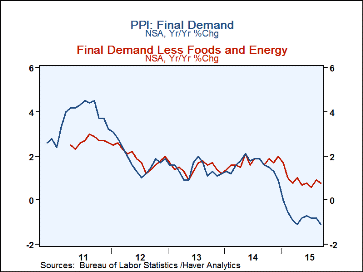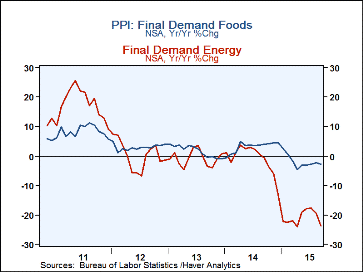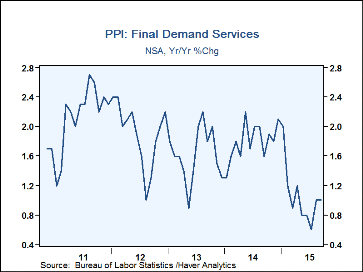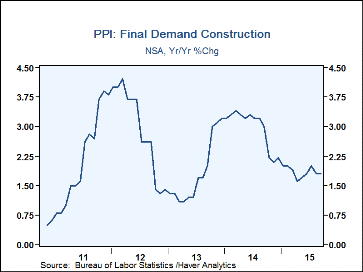 Global| Oct 14 2015
Global| Oct 14 2015U.S. Producer Price Decline Is Broad-Based
by:Tom Moeller
|in:Economy in Brief
Summary
The overall Final Demand Producer Price Index fell 0.5% in September (-1.1% y/y) following an unrevised zero change in August. It was the first decline since April. The Action Economics Forecast Survey expected a 0.2% decrease. Prices [...]
The overall Final Demand Producer Price Index fell 0.5% in September (-1.1% y/y) following an unrevised zero change in August. It was the first decline since April. The Action Economics Forecast Survey expected a 0.2% decrease. Prices excluding food & energy also fell 0.3% (+0.8% y/y) and reversed a 0.3% increase. A 0.1% rise had been expected.
Final demand goods prices (35% of the total index) fell 1.2% (-5.1% y/y), down for the third straight month. The latest decline was led by a 5.9% drop (-23.7% y/y) in energy prices. Gasoline prices were off 16.6% (-42.8% y/) and home heating oil prices fell 6.5% (-44.1% y/y). Residential natural gas prices reversed most of the prior month's gain and declined 1.1% (-11.8% y/y) and residential electric power costs eased 0.1% (+1.0% y/y). Food prices declined 0.8% (-2.9% y/y), off for the second time in three months. Egg prices have been quite volatile and fell 18.2% m/m, but they have risen by roughly three quarters y/y. Beef & veal prices fell 7.9% (-3.3% y/y) while bakery product prices gained 0.1% (1.1% y/y). Fresh & dry vegetable costs rose 14.7% y/y, but dairy product costs were off 15.0% y/y.
Final demand goods prices excluding food & energy remained stable (0.2% y/y) after falling 0.2% in August. Core finished consumer goods rose 0.2% (2.6% y/y) after two months of remaining unchanged. Core consumer nondurables costs improved 0.2% (3.4% y/y), following two months of no change or slight decline, but consumer durables rose 0.3% (1.6% y/y). Private capital equipment costs improved 0.1% (1.3% y/y) while those for goods for government purchase declined 0.2% (-0.1% y/y). Prices of goods for export fell 0.5% (-3.6% y/y), down for the third straight month.
Final demand services costs (63% of the total index) declined 0.4% (+1.0% y/y) and reversed the August increase. This was led by trade services, which fell 0.4% (+2.1% y/y); trade services represent the margins charged by retail and wholesale dealers and merchants. Prices for transportation of passengers fell 1.8% (-6.6% y/y), repeating their August weakness. Prices for transportation and warehousing of goods in September also repeated the prior month's 0.3% decline (-2.4% y/y). Other services, including financial, health care and communications, among others, fell 0.3% (+1.0% y/y) after a 0.2% rise.
Final demand construction prices (2.0% of the index) remained unchanged (+1.8% y/y) after a 0.1% dip. Private capital investment costs were unchanged (1.8% y/y).
Prices of processed goods for intermediate demand fell 1.5% (-8.2% y/y), the largest of three consecutive declines.
The PPI data are contained in Haver's USECON database with further detail in PPI and PPIR. The expectations figures are available in the AS1REPNA database.
Economic Outlook and Monetary Policy from Fed Governor Lael Brainard can be found here.
| Producer Price Index (SA, %) | Sep | Aug | Jul | Y/Y | 2014 | 2013 | 2012 |
|---|---|---|---|---|---|---|---|
| Final Demand | -0.5 | 0.0 | 0.2 | -1.1 | 1.6 | 1.3 | 1.9 |
| Excluding Food & Energy | -0.3 | 0.3 | 0.3 | 0.8 | 1.7 | 1.5 | 1.9 |
| Goods | -1.2 | -0.6 | -0.1 | -5.1 | 1.3 | 0.8 | 1.7 |
| Foods | -0.8 | 0.3 | -0.1 | -2.9 | 3.2 | 1.7 | 3.0 |
| Energy | -5.9 | -3.3 | -0.6 | -23.7 | -1.0 | -0.8 | 0.2 |
| Goods Excluding Food & Energy | 0.0 | -0.2 | 0.0 | 0.2 | 1.5 | 1.1 | 1.8 |
| Services | -0.4 | 0.4 | 0.4 | 1.0 | 1.8 | 1.6 | 1.9 |
| Construction | 0.0 | -0.1 | 0.5 | 1.8 | 3.0 | 1.8 | 2.9 |
| Intermediate Demand - Processed Goods | -1.5 | -0.6 | -0.2 | -8.2 | 0.6 | 0.0 | 0.5 |
Tom Moeller
AuthorMore in Author Profile »Prior to joining Haver Analytics in 2000, Mr. Moeller worked as the Economist at Chancellor Capital Management from 1985 to 1999. There, he developed comprehensive economic forecasts and interpreted economic data for equity and fixed income portfolio managers. Also at Chancellor, Mr. Moeller worked as an equity analyst and was responsible for researching and rating companies in the economically sensitive automobile and housing industries for investment in Chancellor’s equity portfolio. Prior to joining Chancellor, Mr. Moeller was an Economist at Citibank from 1979 to 1984. He also analyzed pricing behavior in the metals industry for the Council on Wage and Price Stability in Washington, D.C. In 1999, Mr. Moeller received the award for most accurate forecast from the Forecasters' Club of New York. From 1990 to 1992 he was President of the New York Association for Business Economists. Mr. Moeller earned an M.B.A. in Finance from Fordham University, where he graduated in 1987. He holds a Bachelor of Arts in Economics from George Washington University.
More Economy in Brief
 Global| Feb 05 2026
Global| Feb 05 2026Charts of the Week: Balanced Policy, Resilient Data and AI Narratives
by:Andrew Cates










